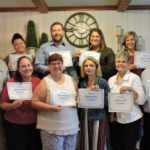

I don’t hide the fact that I have the CELA designation, a Master's degree in tax and an estate planning certificate. However, I am not suggesting that only people who have the CELA designation know what they're doing. I certainly think that there are very competent attorneys who, for whatever reason, have chosen not seek the designation. My point here is to comment on why in our workshops, we emphasize the importance of working with someone who knows what they're doing.
Legal consumers only know what the attorney tells them, in person, on their website, or in marketing materials. I frequently see people who went to an attorney who held themselves out as an elder law attorney, and got things wrong; the clients later hire us to clean up the mess.
I am often asked in those cases, if he didn't know what he was doing in elder law, why did he hold himself out as an elder law attorney? I honestly don't know the answer. Because of this, in our workshops we talk a lot about the need to work with somebody who is qualified. Regardless of whether or not an attorney has a CELA designation, we certainly believe that attorneys who practice elder law need to be well versed in elder law.
A potential client once told me that they were going with another law firm which does everything that we do but at a lower cost. I suggested that the client ask the attorney how many asset protection trusts they did the previous month, and how many Medicaid applications they have filed.
The consumer came back to me and said that the attorney that they did not did any asset protection trusts last month and they had no current Medicaid cases, although they have done those in the past. By contrast, the client was astonished at the number of both we have done, and realized the difference between calling oneself an elder law attorney and actually doing it for the living.
We take pride in being a “boutique” law firm which practices only estate planning and elder law. If you have other legal needs, we urge you to go to another attorney.
In this case, the client was very upset to learn the that attorney did not know what they were doing and was perplexed that they could hold themselves out as an elder law attorney. Anybody can hold themselves out as an elder law attorney, but that doesn’t mean that they have an expertise in the area.
When we have to be brought in to clean up so many cases that were messed up, that adds significant additional expensive for the client. Therefore, I have become much more diligent in spreading the word that people need to work with somebody who knows what they're doing. While proud that I have obtained certified elder law attorney designation, I understand that there are others who are as good; but it is important for the consumer to be sure that any attorney knows what they are doing before retaining them.
Consumers who need help in estate planning and elder law need to do their homework to ensure that the attorneys they are working with are skilled in that area. If you need an expert in the areas of estate planning and elder law, we are happy to help. Join us for one of our upcoming workshops!


